FCA’s Youth on the Move -report encourages seeing young people all over the world as good and promising.
Have you ever sighed: Kids these days, or: What is the world coming to? Young people do not think like this. They look at the world ready to build their future, or with fear, without the opportunity to influence it. It is up to adults to decide how the situation of the world’s youth develops.
Right now, no one seems to know.
The world is undergoing big changes and is somehow out of place. Over the past two decades, there has been a great deal of progress. On the other hand, a new kind of instability is spreading, inequality is growing, streams of people are moving across borders, and the state of the environment is worsening. Human rights and the obedience to humanitarian law are strongly questioned. Trust in political and social institutions is declining.
In this changing world, there are 1.8 billion young people aged 15 to 24.
The percentage of young people is remarkable especially in countries with a great deal of poverty and uncertainty. Nine out of ten young people live in developing countries. The new FCA Youth on the Move report speaks particularly on the behalf of these young people. Youth have often been given little attention in aid work. It should not be like this.
Aid organisations must participate more in young people’s lives, listen to them, and renew their work to better include the youth. The new report provides suggestions on what the next steps could be.
Do not see youth as a threat
Youth are often seen as a threat. Society’s fears and hopes are projected onto youth. According to the FCA report, youth and young people’s activism should not be feared or constrained, but instead it should be seen how working on behalf of a cause develops responsibility and understanding.
Above all, youth should be provided with opportunities.
Youth means being in a constant movement. The movement takes place on the inside as well, as transitioning into adulthood turns the young person’s inner world upside down.
When young people are looking for education and an occupation, they are making big decisions. As opportunities for the world’s youth are not equal, for some youth means the acknowledgement of being disadvantaged and socially excluded.
Some of the world’s youth are on the move geographically, even across national borders. Ten percent of the world’s refugees are aged 15 to 24.
Refugee youth needs protection
The report emphasizes that refugee youth should be guaranteed protection and psycho-social support. For example in the large refugee camps in Bangladesh, FCA widens the possibilities for young women and teenage girls through education and protection.
Although acknowledging the rights of women and girls is a priority, men and boys should not be forgotten. Young boys in difficult circumstances need protection as well.
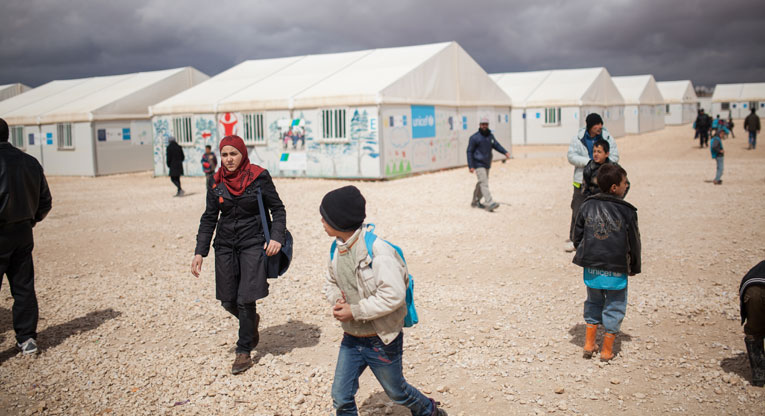
When the Syrian Hanani family fled from Syria to Jordan, they thought they would leave for a few weeks. Photo: Ville Asikainen.
”Give immigrants opportunities for personal development. It was hard to start from the beginning in a new country; I had no idea where to find work, or how and where to send applications.”
Response from the FCA Voices of the Youth questionnaire.
Education is a privilege
Finn Church Aid works on behalf of young people in all its countries of operation. What do young people hope from us?
The respondents to the UN My World questionnaire, seven million young people from 194 countries, considered high-quality education, health care, occupational security, and good government to be most important.
Youth living in a poor and unstable environment are much more often deprived from education and work than those in a stable environment. Many of the youth in the most fragile circumstances never get to go to school, and have to work in the grey economy in order to make a living. For these young people, education is a privilege. This has been noted by the FCA employees working with former serfs in Nepal. Education has opened up a new life for these young people.
Towards employment
So far, the education efforts of the international community and aid organisations have focused on access to basic education; now it is about the time to invest in the education of young people over 15 years.
The right of youth to get (back) to school, occupational training and higher education must be guaranteed. States must allow work permits to youth who are on the move.
An official certificate of education must be provided for the youth, valid in the country of residence or the country the person returns to. For example, in Uganda, refugees are able to get an entrepreneur degree in a training collaboratively organised by FCA and the Finnish organization Omnia Education Partnerships Oy.
Study counselling, cooperation with employers and internships should be used to ensure the link between education and employment. In order to create unity and avoid confrontation, it is also important to take into account the youth of the original population who are at risk of social exclusion, like in Jordan and Uganda, where FCA trains both immigrant and local youth.
Youth soon to be the majority
All youth should have the universal rights to organise, assemble, express their opinion, move freely, and participate in societal affairs. In reality, in many societies these rights are not realised.
However, in many countries where FCA works, young people either are or will soon be the majority that cannot be ignored.
Youth are ready to take action against the global phenomenon known as the shrinking space of the civil society, if we give them the chance to participate as active citizens.
For example, in Cambodia, the FCA youth network Changemaker Cambodia campaigns on behalf of the importance of education, encourages young people to take leadership, and helps them to get their voices heard in a society where young people do not traditionally have much of a say in decision-making even regarding their own life.
In Myanmar, FCA organises workshops on peace work for youth from different ethnic groups. In Kenya and Somalia, young people from different groups are brought together by inviting them to take part in projects of small-scale entrepreneurship.
Is the potential of youth on the move utilised? Many of them want to work, get to know the original population, and take advantage of the opportunities in the new country.
It is not just a cliché to say that youth are the future. If we advocate for the rights of the youth now, they will be able to build a world in which we can all lead a good life.
Text: Ulla Kärki
Translation: Leena Vuolteenaho
Illustrations: Emmi-Riikka Vartiainen
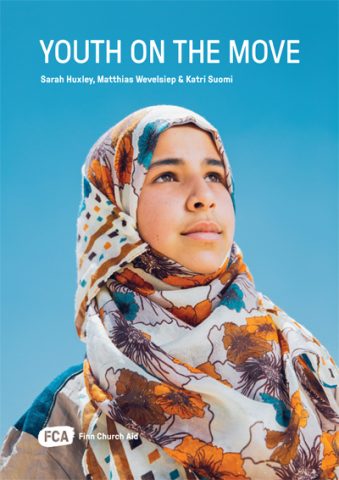
Youth on the Move -report online (pdf)
Young people living in fragile conditions are not currently being taken into sufficient account in the field of humanitarian work and development cooperation. According to Youth on the Move, a report published by Finn Church Aid on 26 April, young people often tend to slip through the various forms of work and funding. Nevertheless, youth on the move are dynamic actors having enormous potential as builders of their own lives and societies.
“Civil society organisations should listen to young people more and reform their work to take better account of youth,” says Matthias Wevelsiep, Development Manager at the FCA.
“Currently, development cooperation, humanitarian aid and other such areas of work are unable to respond properly especially to the needs of Youth on the Move.”
There are about 1.8 billion people between the ages of 15 and 24 in the world today. Youth represent a large share of the population especially in countries with a great deal of poverty and uncertainty. Nine out of ten young people live in the developing countries. Young people also move increasingly from one place to another. In fact, 10 percent of the world’s refugees are 15 to 24 years of age.
Youth are on the move in more ways than one, moving from childhood into adulthood and through education and training to the job market. They also move in terms of geography either voluntarily or forced.
Refugee youth also have the right to education and livelihood
Through the report, the FCA wishes to foreground youth as active builders of their own future and the future of their communities and as enablers of change.
Especially in fragile situations, the transition of youth from one phase of life to another is interrupted and they may have to wait even for a long time to get on with their lives. Many of the youth living in difficult situations have to work in the grey economy in order to get by.
“We should be supporting young people’s access to education and training, offering them opportunities to continue with interrupted schooling,” says Wevelsiep.
“For example, youth in refugee camps should also be offered diplomas that make them eligible for further studies and employment both in their countries of residence and their countries of origin.”
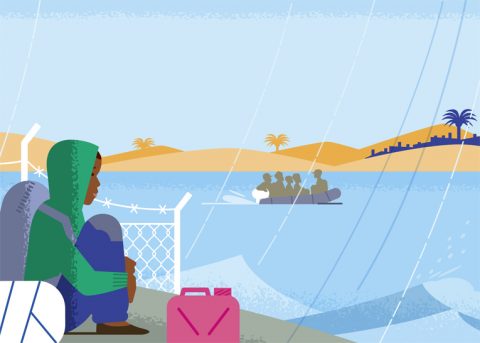
“Before training, I had nothing”
Providing vocational training in the developing countries is of the greatest importance in terms of youth and refugee policies, as well as national security.
“In Uganda, we are arranging vocational and entrepreneur training for local and refugee youth,” says Wevelsiep. “Up to 73 percent of the young people who have completed their training either have found employment or have established businesses of their own.”
“Before training, I thought I didn’t have anything unique of my own. I was just like all the other girls. Now after training, I know how to do something not everybody else does,” says Daphe Nantesa, a 17-year-old from Uganda, who participated in hairdresser training provided by the FCA.
FCA arranges entrepreneur training in Jordan for Syrian refugees and local Jordanian youth. Meanwhile, at the refugee camps in Za’atari and Azraq, the FCA also offers recreational activities, such as English lessons, a circus school and soccer.
Youth between the ages of 18 and 24 in unstable situations need protection as well. They are no longer covered by child protection measures, but they have a high risk of becoming victims of abuse, violence or neglect.
Nevertheless, the FCA report insists that we should not focus merely on the problems of youth.
In the words of Matthias Wevelsiep, “The potential of youth for active and dynamic action should be recognised and they should be empowered to participate in societal decision making and building the future.”

Youth on the Move Report (pdf)
Finn Church Aid and Omnia Education Partnerships Oy offer qualification program for refugees living in Uganda.
From spring 2018 on, refugees in Uganda will have the opportunity to graduate from the Finnish Further Qualification in Entrepreneurship. The qualification program is organized by FCA and Omnia Education Partnerships Oy (OEP) in close cooperation with UNHCR.
”Finnish qualifications have a good reputation globally. The qualification training opens up new opportunities for both employment and further studies for the refugees,” says Ville Wacklin, the Project Manager of FCA.
Uganda has received approximately 1 800 South Sudanese refugees daily since July 2016. A total number of 1,4 million refugees are currently living in Uganda. Many of them start their own small businesses.
Not only qualification, but sustainable change
The qualification training aims at improving the refugees’ chances to succeed as entrepreneurs. The training is customized to the local context together with the Ugandan experts.
“Our model emphasizes sustainability. We train and certify locals as trainers who then go on to train at refugee settlements. The curriculum and assessment process ensure that we uphold Finnish standards,” says Mervi Jansson, CEO of OEP.
FCA and the European Union construct 28 blocks of 84 classrooms, 28 blocks of 140 stances of inclusive gender-segregated pit latrines and 40 teachers houses in Bidibidi and Omugo refugee settlements to ensure a safe and inspiring learning environment for South Sudanese refugees.
The cheers from Para elementary school travel a great distance from the schoolyard. Classes finish at 16.00 and the children from grades 5 and 6 are on their way home.
After a day of intensive learning, their minds are
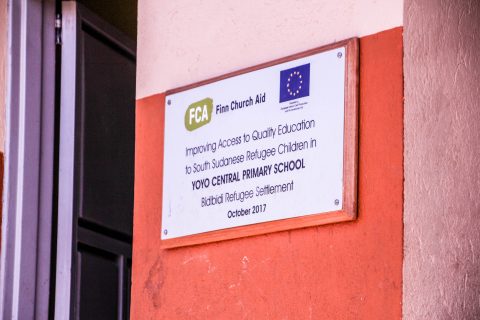
set on future goals. A group of seven friends do not need much time to consider their favourite subjects, when asked. The answer is science and math.
“I want to become an engineer, so that I could for instance design and implement a water supply system at the refugee settlements”, says 16-year-old John.
Same-aged Mary would consider a career as an accountant because she likes to play with numbers, while Emmanuel, 17, longs to be a pilot or driver because he wants to explore the world.
16-year-old Scovia reminds that English is important whatever your dreams might be.
“I would like to become a nurse so that I could help sick people”, she adds.
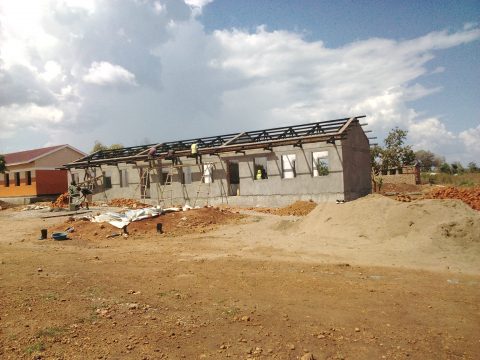
Additional semi permanent classroom at Para Primary School.
21 000 pupils benefit from improved access to quality education
Over 60 percent of the arrivals from South Sudan are children under 18 years old. When arrivals peaked following the eruption of violence in Juba in 2016, it took months for most to continue their education in Uganda. Temporary structures, primarily tents, were set up in the settlements to meet the urgent needs.
Today, children usually resume their studies within days after their arrival, and efforts have focused on upgrading the temporary structures to semi-permanent classrooms of concrete from which refugees benefit. The tents are hot during summers and vulnerable to extreme weather conditions.
FCA is set to complete 28 blocks of 84 classrooms by January 2018 with EU humanitarian funding. The cooperation improves the learning environment in 7 schools in Bidibidi, one of the world’s largest refugee settlements and 6 schools in Omugo settlement, established in August. When finished, FCA’s and the European Union’s project will immediately benefit around 21 000 pupils.
At Para Primary School, the first two blocks of six classrooms and one block of latrines are finished, and the last part of the construction is well on its way.
“The learning centres are established with a high priority not only because of the importance of education, but as a safe space for children and youth”, Denis Okullu, coordinator of the project explains.
Training of teachers key to learning
The cooperation between the European Union and FCA also extends to the teachers, who have more than 1 500 pupils to care for at Para Primary School. One essential training of Teachers in crisis contexts addresses the challenge in dealing with such a large number of students.
“We use a lot of group work and working in pairs in order to manage the situation”, Andero Kasifa says.
A total of 237 teachers are to receive the training and Kasifa is one of them. The project also works on accommodation for the teachers, prepares them for work with children in a crisis context as well as involves parents in supporting a safe and productive learning environment.
Especially children who have been years out of school require attention in order to get back on track. A placement test decides their initial level, and through a process of accelerated learning, they can catch up and complete for instance three grades within one school year.
“The skills we learn help us to help them complete their primary level education”, Kasifa says.
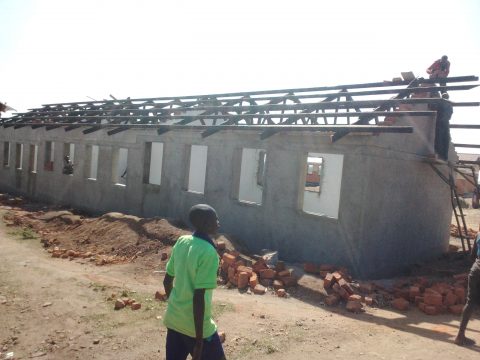
Additional classroom under construction in Luzira primary school with funding EU humanitarian funding.
Ikali Karvinen leads the activities of Finn Church Aid in Eritrea as Education Specialist.
Classes are big, education materials are scarce, and teaching is not held in high esteem in Eritrea. Despite numerous challenges, Eritrean teachers are still interested in developing teaching methods, says Ikali Karvinen.
Karvinen has been leading FCA teacher-training projects in Eritrea since the beginning of 2017.
”On an ordinary day, I guide teachers and colleagues, support the carrying out of research, and plan activities for higher-education institutions to enhance the competence of the personnel,” explains Karvinen.
The political environment in Eritrea is challenging, and many are initially suspicious of foreign operators. Building trust is important.
In addition to scarcity of water and electricity, poor data-communication connections make days very different from those in Finland. According to Karvinen, several things require many times the amount of time.
”My colleague and I laugh at not being able to open a single news report online in up to four days – so life is hard for news addicts!”
From nurse to Education Specialist
Karvinen describes his career path as atypical. After graduating as a nurse, he supplemented his studies in nursing science, and ended up in Kenya to collect research data for his PhD thesis. He earned his PhD in Public Health in 2009.
”Eritrea has been a school of diplomacy for me. I have met people who, despite personal and their home country’s difficulties, look into the future with confidence and hope,” says Karvinen.
The results of the work are not seen instantly, not even in a year or two. With his work, Karvinen hopes to promote cooperation between teachers and different stakeholders, and evidence-based education.
”We believe that the teachers we are working with are the forerunners of a new kind of teachership. They will train future teachers with new methods.”
Text: Minna Elo
Safe schools and competent teachers are key in determining the future of the Central African Republic. The work of Finn Church Aid has encouraged local children and young people to return to school.
Squeals can be heard from a distance at the yard of Sangha school. It is recess, and the air is thick with red sand, with a group of boys running after a football turned yellow by the sun.
In the white classroom, little wooden desks are placed close to one another. The classroom can seat 150 pupils. The ones who do not fit in are left to peer in through the window. At the start of the school day, the number of pupils present for the day is marked in the upper corner of the chalkboard.
Although the school is crowded, it is in better condition than it was two years ago, when 14-year-old Christopher Tindo started at the school.
”The school was missing doors, windows and benches. They had all been stolen or broken. Now we can leave our books at school and lock the door, and no one can get in to take our things,” says Christopher.
Conflict took the doors from the school
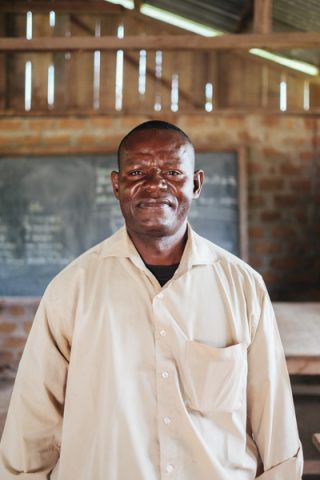
Jean Lessene thinks the most important function of a school is to teach how to live in peace.
The history of the Central African Republic is mottled with bloody tyranny and coups. In 2013, the situation turned violent, when the Séléka group consisting mostly of Muslims seized power, and the mainly Christian Anti-balaka groups rose to fight it.
The armed groups used school as bases because of their central locations. Most schools have been damaged or completely destroyed in the conflict. Education sector head Jean Lessene from Bayanga subprefecture says that armed groups took anything that could be used for firewood, up to the roof and the desks, and looted anything that was the least bit useful.
Families fled to the jungle, to farther-off villages, or across the border to neighbouring countries. Many children have not dared return to school.
Authorities, Finn Church Aid (FCA) and churches have campaigned together to get the children to return. The work has garnered resuts, and in many schools the number of pupils has doubled.
”Before the war, Muslims and Christians lived and went to school together. During the fights, Muslims fled, and some of them still have not dared return. We hope they come back,” says Lessene.
Educating teachers has enormous importance
Not all teachers have returned, either. Educated people either flee or seek better-paid employment. The ones left are less educated teachers and volunteers.
In Bayanga, out of the 43 teachers in the schools only five had gone through the official teacher training. Now, FCA has trained 17 teachers and pays them a small fee. Many of them had no prior experience of teaching.
”Thanks to the FCA training and teaching materials, they are now able to teach the children better. Without this support, education would not matter much around here,” says Jean Lessene.
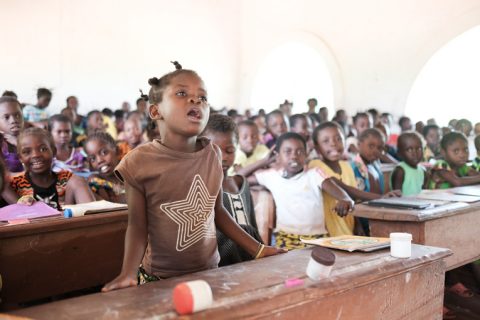
The competition for a turn to answer a question is fierce, with up to 150 pupils per class.
Geography without maps
The wall is high, and shards of glass glitter on top of it. No one will climb over this wall to the FCA regional office in the city of Berbérati in a hurry. Walls like this are a common sight in Central Africa. The situation remains unstable.
Over 63,000 children got to go to school
Central African Republic is one of the poorest countries in the world. In 2017, it was named the third most fragile nation after South Sudan and Somalia.
Nearly half of the population (2,2 million) is in need of humanitarian aid. According to UN estimates, almost half a million citizens of the Central African Republic are refugees in neighbouring Chad, Cameroon and the Democratic Republic of the Congo.
Finn Church Aid opened a country office in the capital Bangui in autumn 2013, and has worked in the midst of the Central African chaos ever since. FCA provides humanitarian aid to those in the most acute need, supports the development of education in the middle of conflict, and helps communities prevent and settle conflicts.
In 2016, more than 63,000 children benefitted from FCA’s education projects in the Central African Republic.
However, the gate is now opened, as a lorry backs to the yard. Kofi Ayisa is satisfied, school supplies are finally delivered. The lorry is filled with books, notebooks and pencils.
The delivery is a few days late, because the lorry got stuck in mud a couple of times during the journey. The rainy season is beginning, and the roads are a muddy mess.
”We are working in the parts of Africa that are the hardest to reach. More than once we have got stuck while on the road, and we have been forced to sleep in the car, in the middle of the jungle, pestered by mosquitoes,” says Ayisa from Togo, in charge of the FCA regional office in the city of Berbérati.
In rural Central Africa, getting around is very difficult. When FCA employees leave the Berbérati regional office for the village of Nola 150 kilometres away, the journey is estimated to take five hours.
”And this is a road in fairly good condition. We go to places that most organisations do not go. In many places, we are the only aid organisation. Someone needs to do this job, and FCA will be there. The challenges are big, but you have to start from somewhere.”
Despite diamonds, gold and other natural resources, Central African Republic is one of the poorest and most underdeveloped nations in the world. Berbérati is the nation’s third-biggest city but lacks running water and electricity.
In rural areas, there is also an enormous need for school supplies. It is common, for example, for geography to be taught without maps. The children cannot locate their own village on a map, let alone Central African Republic or its neighbouring countries.
”These children are supposed to go to university without ever having seen a map or a microscope – and they are meant to become doctors and decision-makers!” says Ayisa.
School teaches forgiveness
Despite difficulties, school brings stability to everyday life and and creates hope for the future. In Central Africa, the eagerness of the students gives hope.
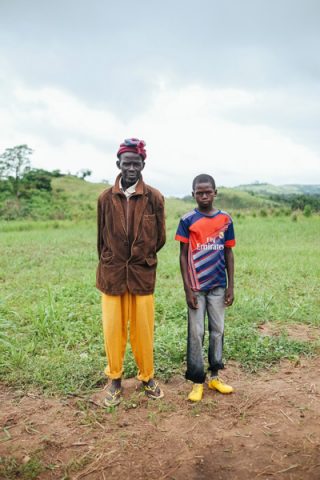
Christopher Tindo’s favourite thing about school is peace education. Grandfather Aobimou Nzerebaile
encourages the boy to study.
14-year-old Christopher studies hard. If he does not understand the subject of the lesson, he spends recess indoors going over it again. He dreams of becoming a teacher.
Head of the education sector Jean Lessene thinks that at its best, school can bring society together.
”The most important things that school can teach are the significance of peace and social unity,” says Lessene.
”Getting children back to school is a job for the entire society – the village community, parents and the government. It is the only way to guarantee a better future for this country.”
Christopher’s favourite subject at school is peace education. It involves the teacher talking about peace, living together, forgiveness and reconciliation.
“Peace is very important, and everyone should cherish forgiveness, love and joy everywhere in their own countries,” explains Christopher.
Text: Noora Jussila
Photos: Tatu Blomqvist
Nowadays, more and more children get to go to school, but millions of children and young people are still left without skills needed in work.
Education is in crisis. This conclusion was reached by World Bank researchers as they wrote the 2018 World Development Report published in late September.
Giant leaps have been taken in the field of education over the past 200 years, and today, most children get to go to comprehensive school. However, merely going to school does not guarantee learning, the researchers write in the report.
In countries of low and medium income level, secondary education is completed by just one in three children. Over 60 percent of comprehensive school pupils in developing countries do not even learn basic skills in school. In countries of high income level, basic skills in e.g. mathematics are attained by nearly all pupils.
If skills learned in comprehensive school are weak, many are left lacking skills needed in work, such as basic skills in mathematics or in reading and writing.
“The report paints a disturbing picture of the magnitude of differences in the quality of education. Going to school does not guarantee learning. Without high-quality education, millions of young people are left without essential skills”, says Finn Church Aid Manager of Advocacy Katri Suomi.
“School should teach skills that help young people secure a job and lead a meaningful life. Education is key in preventing social exclusion and lifting people up from poverty.”
Teachers play a key part
If the children skip school, sometimes even the teachers do not show up. The report tells of surprise inspections to schools in seven African countries. On the day of the surprise visit, one out of five teachers was absent altogether, and two out of five teachers were somewhere other than in their own classroom, albeit in school. In rural areas, the situation is even worse.
If the teacher is present, his or her skills may be lacking. This is because the most talented pupils do not want to become teachers themselves. According to the report, in almost all countries, the 15-year-olds who want to become teachers receive lower-than-average results e.g. in PISA tests.
In a test conducted in 14 sub-Saharan countries, sixth-grade teachers received, on average, the same results as their best pupils.
In fact, training teachers is key in improving the quality of education.
“Training teachers is by far the most effective way to raise the quality of education. All of FCA’s education projects feature educating teachers as a key part”, says Suomi.
In 2016, FCA trained a total of 4,693 teachers in countries including Eritrea, the Central African Republic, and Nepal. Development work is conducted in cooperation with authorities in countries of operation to develop teacher training and e.g. school curricula.
More than 260 million children do not go to school
However, the biggest obstacle to learning by far is still not going to school at all. In 2016, more than 61 million children of comprehensive school age and as many as 202 million children of secondary school age did not go to school.
As many as one third of these children lived in fragile countries or in conflict zones. For example, in Syria, over 1,8 million children were left without education in 2013.
According to the report, among the first to be left outside school are those already in a vulnerable societal position because of gender, disability, caste, or belonging to a certain ethic group. Poverty is still one of the biggest obstacles to a child going to school.
The quality of education plays a part as well. If the quality of education is seen as poor, parents may not be ready to send their children to school, says the report.
“Especially in fragile countries and in catastrophes, education creates faith in the future and brings stability to everyday life. Lack of visions for the future drives people to look for better opportunities elsewhere, sometimes it drives young people to join extremist groups”, says Katri Suomi.
“Everybody benefits from investments made in education and in the quality of education. Education is important for societal development and for diminishing inequality.”
Words: Noora Jussila
In the Palestinian regions, farming is one of the main sources of income for women, and a gateway to education for young people. Before Finn Church Aid’s (FCA) project, the people of Deir Ballout were on the brink of despair.
Cucumbers, okra, tomatoes, pumpkins, onions and plenty of grains. The fields spread out a long way to the left and right of the asphalt road leading to the village of Deir Ballout. A donkey is braying on 48-year-old Ibtisam Musa’s neighbour’s yard. It’s almost 11 AM, and around this time she usually prepares a meal.
”Normally I’m out in the field from 6 to 10 in the morning, and from 5 to 8 in the evening. When it’s this cloudy, though, the scorching sun doesn’t bother me,” shares Musa while doing some weeding.
Deir Ballout is called the bread basket of Salfit Governorate, home to 65,000 people. In addition to the crops, the farmers prepare and sell products such as couscous, honey, olive oil, cheese and za’atar spice blend.
However, the main product is Armenian cucumber, known among the locals as ‘snake cucumber’. According to Musa, everyone knows Deir Ballout for its snake cucumbers, and every year the village holds a festival to honour the plant.
”In the future, we’re also planning on trying to grow medicinal herbs,” says Musa.
For years, the farmers were unable to dream about the future. Before the collaboration with FCA that started in 2015, the villagers were desperate. Wild pigs had spread out in the area, and before long, destroyed crops were threatening to rob the locals of their work and self-sufficiency in food production.
”The wild pigs destroyed almost everything. Many people left their fields in search of other employment,” she says.

Deir Ballout is known as the bread basket of Salfit Governorate. Here, there’s a total of 1,2 km2 of fields, spreading out on each side of the road to the village. Photo Tatu Blomqvist
The ones to suffer firsthand were the women, who are in charge of most of the farming in the Palestinian regions. Musa is a member of a cooperative of 21 people, almost all of whom are women. Her income plummeted from over 7,000 euros a year to about 1,200 euros.
With support from FCA, the villagers solved the problem by building a fence around the fields last summer. The farmers returned, and one year on, the crop has been spared from the wild pigs. Musa’s income is returning to normal. She also praises the project itself for its effect on the community of 5,000 people.
”The building of the fence was carried out as a volunteer project. The success inspires the community to do more volunteer work, and it has increased our productivity”, says Musa.
With her income, Musa has paid for her children’s education. She has two sons and six daughters. Two of her children have graduated as engineers, one as a lawyer, and one as a teacher.
Musa has worked hard for her children’s education and earned the nickname “iron lady” from the other villagers.
”Our children are highly educated. Deir Ballout has produced doctors, ambassadors and members of parliament, working both here and abroad. It’s all thanks to our perseverance.”
Text: Erik Nyström, Photos: Tatu Blomqvist
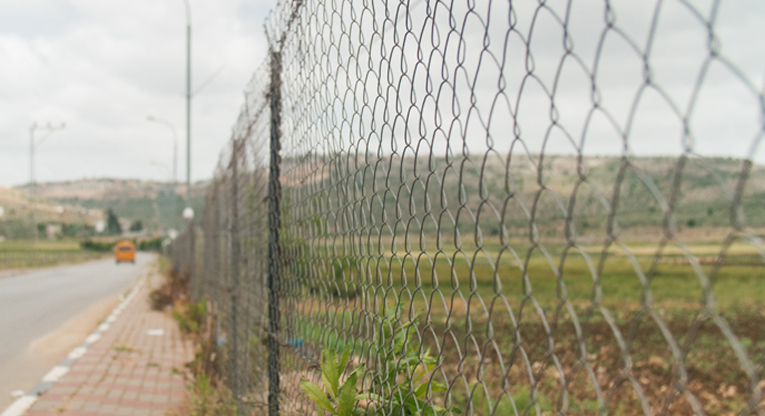
Finn Church Aid has helped the village of Deir Ballout to build a fence. Thanks to the fence, the farmers’ income is returning to normal. Photo: Tatu Blomqvist
Violent attacks are increasing in the Central African Republic. The situation has thus far not affected Finn Church Aid’s work in one of the world’s poorest and most fragile countries.
United Nations (UN) humanitarian officials warned about an increasing number of violent acts in the Central Africa Republic (CAR) in July. According to the UN, the attacks are increasingly targeting children. There are concerns that humanitarian needs in CAR will escalate to levels previously reached four years ago when the conflict was at its worst.
According to FCA’s country director Katja José, the security situation has worsened especially in the northern part of the country, where armed groups have stopped humanitarian convoys twice during the past couple of weeks, robbing their aid items. Similar incidents have previously been reported from the eastern parts. Earlier this week, the International Federation of the Red Cross and Red Crescent Societies confirmed that six of its volunteers were killed there.
Humanitarian organizations have condemned the attacks and pleaded to the government of CAR and to the UN to secure humanitarian access. An estimated 2,2 million people in CAR rely on humanitarian aid.
“Should the humanitarian assistance stop, the civilian population will be most affected. Then they are forced to survive without food aid, medicines, hygiene products or school items,” José says.
No future without education
FCA established a country office in CAR in 2013. The work is focused on renovating schools that have been damaged by the conflict, delivering school kits and training teachers in and around Bangui and the southwestern parts of the country.
“The villages of Berberati and Nola, where FCA has its sub-offices, have for now been among the safest of regions and we have been able to continue our operations as per usual. Last week we had to cancel a meeting with local officials in Bangui because of the security situation.”
Renewed fighting has forced more than 150 000 people to flee their homes in the first half of 2017.
“There are a lot of children living in the refugee camps in CAR, who have been separated from their families. Many women have lost their husbands and are now single parents.”
The need for development cooperation is dire even in the midst of the conflict.
“In conflicts, education is often overrun by other needs, but if a generation grows without the possibility of going to school and receiving education, do they have a future? Education is a human right and everyone should commit to guaranteeing children the right to education.”
José moved to CAR two months ago. She has previously worked for different NGO´s in Mozambique, Tanzania and Zambia.
“CAR is clearly poorer than countries that have enjoyed peace for a longer time. In the beginning of 2000, Zambia and Mozambique were among the poorest of countries, but now both are better off than CAR. I believe that the reason for this is that the people have been able to go to school, farm their land and go to work – and these are the things that many people can’t do in CAR because of the fighting.”
Finn Church Aid’s (FCA) work in the world’s most fragile states brings significant results in all areas of operation. The results are published in FCA’s annual report 2016.
FCA is an established actor within the education sector, specialised in securing education for everyone, building learning spaces after disasters and enhancing the level of education.
“2016 was a challenging year for us, but we achieved remarkable results in all areas of our work. Especially our work with quality education grew significantly. This is very important now that less and less global aid is allocated to education”, says FCA’s Executive Director Jouni Hemberg.
The decreasing share of funding to education puts other development goals at risk, according to the U.N. Aid allocations to education are falling for the sixth year in a row and last year education received only 2.7 per cent of total aid available.
Despite the overall trend, FCA doubled the amount of its education projects in 2016 with the aim of increasing access to quality education for children and youth.
The achievements include the incorporation of career counselling into Cambodia’s national curriculum and the construction of hundreds of learning spaces in Nepal, where FCA is the second biggest international organisation to reconstruct earthquake-damaged schools. Last year FCA’s work resulted in access to education for 63 000 children in the Central African Republic.
A total of 132 000 children and youth benefited from FCA’s education projects in 2016 and 4 693 teachers took part in trainings in program countries.
Last year was also marked by budget cuts when the Finnish government’s decision to reduce funding for development cooperation came into force. FCA’s government funding was reduced from 15,5 million euros to 8,3 million. However, FCA continued to see positive development in the cooperation with international donors , and the international funding exceeded that of the state. Private and corporate donations exceeded targets for 2016.
In 2016 FCA’s expenditures were 34,7 million euro, of which 29,1 million was allocated to international aid. FCA is Finland’s largest organization in development cooperation and second largest in humanitarian aid. FCA is specialised in three themes: quality education, sustainable livelihoods and peace.
The work for sustainable livelihoods reached impressive results for instance in Nepal where 98 percent of families participating in women’s entrepreneurship programme have risen past the poverty line at the conclusion of the programme. In South Sudan local peace agreements were signed among stakeholders within Boma state and between Boma and Jonglei states, and over 90 percent of participants expressed their satisfaction in the process supported by FCA.
FCA works for peace in Finland. Since last autumn the project Reach Out supports religious communities in their grassroots level work against prejudice and hate speech.
Finn Church Aid Annual Report 2016 (pdf)
More information:
Jouni Hemberg, Executive Director for Finn Church Aid, p. +358 50 325 9579
jouni.hemberg(a)kirkonulkomaanapu.fi
Mikko Koivumaa, Head of Communications, p. +358 40 559 4030
mikko.koivumaa(a)kirkonulkomaanapu.fi










